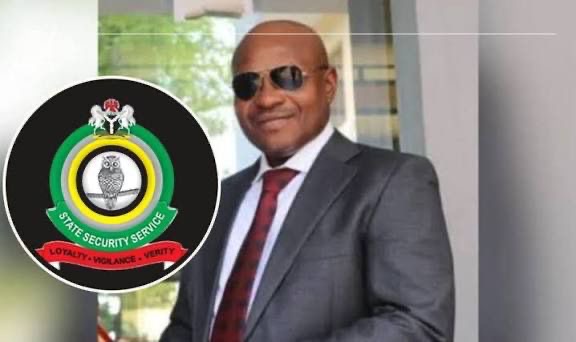
Tosin Ajayi’s DSS: Balancing Security with the Rule of Law
By: Deji Adesogan
One year on, DSS reforms show quiet transformation under Ajayi’s leadership. When President Bola Ahmed Tinubu appointed Mr. Adeola Oluwatosin Ajayi as Director-General of the Department of State Services (DSS) on August 26 2024, expectations were high that the new boss would reform and reposition Nigeria’s foremost intelligence agency for professionalism, accountability and efficiency.
One year later, Mr. Ajayi’s quiet but firm leadership is reshaping the Service and restoring public confidence in its operations.
A career intelligence officer who joined the DSS in 1990, Ajayi is widely regarded within the security community as a disciplined, meticulous and reform-minded professional. Before his appointment he served as State Director in several states including Rivers, Bayelsa, Bauchi, Enugu and Kogi and later rose to the rank of Assistant Director-General. His elevation came at a time Nigerians were demanding greater transparency, professionalism and respect for human rights from security institutions.
Since assuming office, Ajayi has anchored his leadership on two core principles strict adherence to the rule of law and the protection of citizens’ rights within the framework of national security. He has made it clear that the DSS must operate as a lawful institution guided by constitutional boundaries, due process and accountability to the Nigerian people.
One of the most remarkable shifts under his tenure has been the Service’s effort to correct past injustices and strengthen its human-rights record. In July 2025, the DSS released 12 detainees who had been held under prolonged investigations and paid millions of naira in compensation. In another instance a Sokoto-based businessman who was accidentally shot during a past operation received ₦20 million and lifetime medical care from the Service.
These unprecedented gestures have been hailed by human-rights groups, civil society organisations and community leaders as a bold demonstration of the Service’s new commitment to fairness and justice.
Beyond reforms and rights protection, the DSS under Ajayi has also achieved notable operational successes through its tactical and field units nationwide. Working closely with sister security agencies, DSS operatives have disrupted several terror cells, foiled kidnapping plots and neutralised armed criminal networks across the North-East, North-West and Middle Belt regions. The Service has equally played key roles in pre-empting threats to national institutions, preventing sabotage and protecting critical infrastructure.
Security sources say many of these operations were intelligence-led and executed with precision a reflection of Ajayi’s insistence on professionalism, minimal collateral damage and inter-agency coordination. His emphasis on intelligence-sharing and community cooperation has improved synergy between the DSS, military, police and civil defence services.
Within the Service, Ajayi has implemented sweeping internal reforms to promote merit, discipline and gender inclusion. The appointment of Mrs. Folashade Adekaiyaoja as the first female Deputy Director-General of the DSS marked a historic milestone and underscored his commitment to inclusivity and leadership diversity.
In a major morale-boosting initiative, Ajayi approved a comprehensive welfare package that included salary and allowance increases for operatives, as well as the clearance of backlogs for officers due for promotion. These steps have significantly improved motivation, discipline and loyalty across the Service. Many personnel describe him as a leader who listens, leads by example and commands deep respect among staff.
Under his watch, the DSS has also expanded training opportunities for officers in modern intelligence techniques, cybersecurity and counter-terrorism. The Service now prioritises early warning systems, mediation and community-based intelligence particularly in volatile regions such as Plateau, Benue and Nasarawa where partnerships with local stakeholders have helped to prevent violent outbreaks.
High-profile prosecutions have featured strongly under Ajayi’s leadership. The DSS is prosecuting key terror suspects including alleged commanders of the Ansaru faction such as Mahmud Usman (aka Abu Bara’a) who was sentenced to 15 years following a guilty plea in a 32-count charge of terrorism and illegal mining. The Service also obtained a court order to fast-track the trial of Khalid Al‑Barnawi and four others, suspects in the August 26 2011 bombing of the United Nations building in Abuja. In addition, DSS action has targeted dismissed operatives: two former officers, Barry Donald and Victor Onyedikachi Godwin, were arrested for impersonation and fraud and are set to face prosecution. These cases reflect a broader push by Ajayi’s DSS to ensure that both external and internal threats are addressed through the courts.
Despite these gains, challenges remain. Nigeria continues to confront terrorism, banditry and organised crime, while public scrutiny of security operations grows more intense. Balancing secrecy with transparency, and firmness with fairness, remains a delicate task. Yet under Ajayi’s leadership the DSS appears to be navigating this balance with renewed purpose and professionalism.
As he enters his second year in office, Ajayi’s leadership embodies a quiet revolution within Nigeria’s intelligence community one rooted in accountability, human rights, operational excellence and respect for the rule of law.
For many Nigerians, the DSS is gradually transforming from a secretive institution into a professional agency that safeguards national security while upholding citizens’ rights and dignity. If sustained, Ajayi’s era may well be remembered as the period the DSS truly redefined its mission in service to both the state and its people.
Deji Adesogan is a security analyst and digital communications expert. He can be reached via adesoganmedia@gmail.com or on X (Twitter) @DejiAdesogan.
